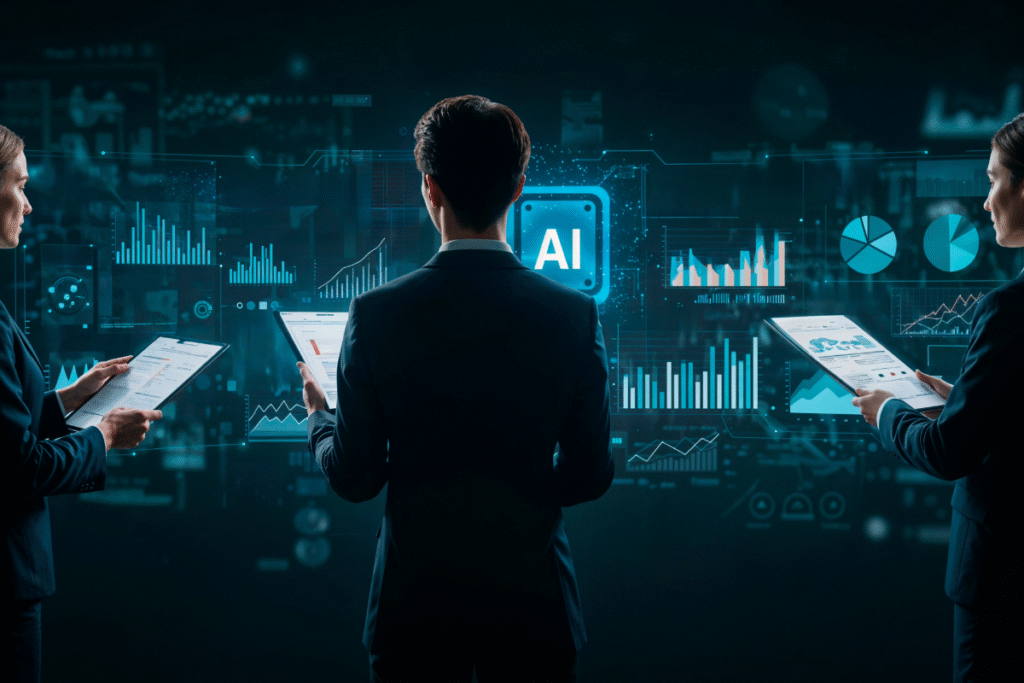Introduction
Artificial intelligence is now a requirement in the actual world rather than a sci-fi idea. By 2025, businesses will radically change the way they operate, enabling faster decision-making, smarter strategy formation, and productivity never before dreamed. Integrating artificial intelligence has proved to businesses that it will change their economies into a digital-first one – and those that have mastered the art of utilizing AI will flourish and grow exponentially exceeding to efficiency operations.
The Role of AI in Modern Business
Artificial intelligence is machine simulation that mimics human intelligence. The automated performing of repetitive operations could be done with the help of AI technologies, with data being processed in enormous volume and used for insights in decision-making. With AI powered marketing, logistics, human resources, finance, and actually nearly all other business functions utterly, business processes have been set in a way into AI.
1. Automating Repetitive Tasks

Automation is the most obvious advantage of AI in business. Data input, billing, and customer service are just a few of the routine processes that are successfully automated by robotic process automation (RPA). Workers can now focus on more innovative and strategic projects instead of wasting endless hours on pointless tasks.
Not only does this save time, but it also cuts down on mistakes and makes things work better across the board.
2. Smarter Decision-Making with Predictive Analytics

Businesses will be adopting AI for predictive analytics to aid in decision-making by 2025. These artificial intelligence algorithms are able to analyze large data sets, identify trends, and forecast outcomes. This means companies can turn data into something truly helpful, such as predicting future sales, setting better prices, or figuring out how customers might behave.
Businesses who employ this type of analytics are able to take advantage of opportunities, reduce risks, and react swiftly to market developments.
3. Enhancing Customer Experience

The main differentiator in today’s competitive landscape is consumer experience-and it has an important role in AI. These chatbots and virtual assistants can be found anywhere, always ready to answer any query that the customer may have in real time without human interference. Furthermore, machine learning algorithms process all user behaviors to personalize contents, offers, and recommendations.
Ultimately, this level of personalization elicits higher levels of engagement, customer satisfaction, and therefore loyalty.
4. Revolutionizing Supply Chain Management

AI has played a significant role in the significant transformation of the global supply chain. By 2025, companies will be adopting AI to manage their inventory, anticipate customer needs, and monitor logistics in real time. AI can help businesses modify their supply chain planning and identify issues before they arise.
This leads to a more robust, cost-effective, and efficient supply chain.
5. Empowering Sales and Marketing Teams

AI technologies are transforming how businesses manage marketing and sales. AI-generated content and automated emails are two examples of how businesses can better engage their audience. AI uses consumer data to evaluate prospects, identify distinct groups, and customize communications.
AI-driven CRM systems are helping sales teams by providing insights into consumer preferences and suggesting the best course of action to close deals faster.
6. Transforming Human Resources

AI in HR makes performance management, training, and hiring easier. It expedites the process by matching applicants, screening resumes, and even conducting some preliminary interviews. Additionally, AI analyzes employee engagement, forecasts potential departures, and modifies training curricula to meet the demands of its users.
A more engaged and effective team is the result of these enhancements.
Benefits of AI Integration for Business Productivity
Firms have incorporated AI within their basic operations; thus, these are tangible performance improvements:
- Elevated Efficiency: Repetitive tasks are performed through automation, whereby human resources are freed to devote more time and effort on more critical activities.
- Better Accuracy: Reduced human performance error, especially in regards to data-driven tasks.
- Generic Cost Reduction: Automation is affording lower operational costs.
- Faster Decision-Making: Real-time data analysis results in agile and informed decision-making.
- Scalability: AI tools grow with the business, adapting to increasing demands without the burden of added labor costs.
Challenges and Considerations
Despite AI’s many benefits, putting it into practice has its own set of difficulties:
1. High Implementation Costs

Even though AI ultimately saves money, the upfront costs would be enormous. The costs for software development, training, and upgrades of the entire system are all there, and businesses should bear the upfront costs.
2. Data Privacy and Security

AI systems thrive on a huge volume of data. The full storage and processing capability of this data need to be ensured so that there are no breaches and the rules and regulations, like GDPR and CCPA, can be fulfilled.
3. Workforce Displacement

Keeping in mind the other side of the issue, which is replacement of manual jobs by automation, there is a growing concern as to how far AI is going to displace jobs. In reality, it could displace some jobs but create others so it is another issue that requires investment in upskilling and reskilling of workers to adapt to the new job functions.
4. Ethical Concerns
Biased AI algorithms and opaque decision-making procedures give rise to ethical dilemmas. It has become incumbent upon businesses to take ethical AI concerns seriously in order to win trust and avoid being unfair.
Trends Shaping AI Integration in 2025
AI is evolving rapidly, and several key trends are influencing its integration into business strategies this year:
- Edge AI: In fields like smart manufacturing and logistics, AI analyzes this data at the point of generation to lower latency and boost process efficiency.
- AI and IoT Integration: By merging AI with the Internet of Things, devices become smarter, and we’re able to derive even richer insights from all those devices talking to each other..
- Explainable AI (XAI): There’s a demand for models that would be so easy to understand, since companies want to know how AI coming up with decisions.
- Industry-Specific AI Solutions: We are observing the emergence of industry-specific AI tools such as those in finance, healthcare, retail, and manufacturing that tend to be more accurate and specialized.
How to Successfully Implement AI in Your Business
If you’re planning to integrate AI into your business operations, here are some best practices:
- Start with a Clear Objective: Identify the problem you want AI to solve.
- Choose the Right Tools: Use scalable and customizable AI platforms that align with your goals.
- Invest in Talent: Upskill your workforce to ensure they can work effectively with AI systems.
- Monitor Performance: Continuously evaluate the effectiveness of AI tools and make necessary adjustments.
- Ensure Ethical Use: Develop policies for responsible AI usage and stay compliant with legal frameworks.
Conclusion
In 2025, AI will be transforming the business landscape. It’s about thinking differently, not just about utilizing new technology. Better customer service, increased efficiency, and a stronger position in the market are all benefits of effective AI deployment.
As AI continues to advance, the more important question is not whether or not to employ it, but rather how soon you can incorporate it into your business plan.
FAQs
A1: In 2025, AI is automating routine tasks, enhancing decision-making with predictive analytics, optimizing workflows, and personalizing customer experiences—leading to faster operations and improved efficiency.
A2: Businesses are using AI-powered CRMs, chatbots, predictive analytics tools, automated marketing platforms, and intelligent virtual assistants to streamline operations and boost productivity.
A3: Yes. Many SaaS platforms offer affordable AI features tailored to SMBs, with scalable pricing and user-friendly interfaces, eliminating the need for in-house data science teams.
A4: Common challenges include high initial costs, lack of skilled talent, data privacy concerns, and employee resistance. However, these can be mitigated with strategic planning and training.
A5: Businesses can measure ROI by tracking productivity gains, cost savings, customer satisfaction improvements, sales increases, and reduced error rates after AI deployment.


1 Comment
Pingback: Starting Your First AI Side Hustle in 2025: Global Beginner’s Guide